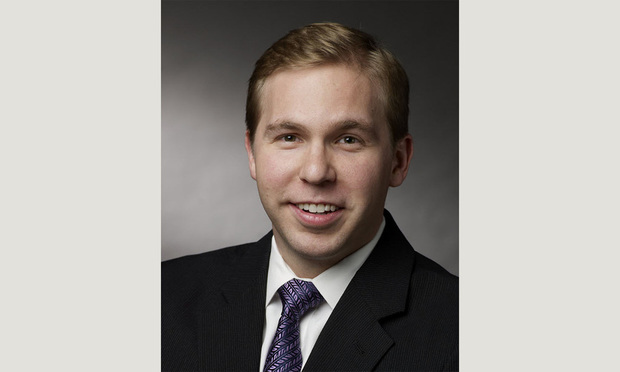Coronavirus and Child Custody Modifications: Dealing with the 'Material and Substantial Change'
Child custody orders are subject to modification when there has been a "material and substantial change in circumstances" and if it is "in the…
May 28, 2020 at 11:43 AM
6 minute read
 Ryan Kirkham is an attorney in the Dallas office of the family law firm Orsinger, Nelson, Downing & Anderson, LLP (Photo: Courtesy Photo)
Ryan Kirkham is an attorney in the Dallas office of the family law firm Orsinger, Nelson, Downing & Anderson, LLP (Photo: Courtesy Photo)
Child custody orders are subject to modification when there has been a "material and substantial change in circumstances" and if it is "in the child's best interests." In a world rattled by COVID-19, it is hard to imagine living through a time when things have changed more materially and substantially from where we started in 2020.
"Material and substantial change" seems to occur with the daily news. What is the impact of this "material and substantial change" through the lens of the Family Code and modifications of child custody orders?
The best place to start is with what often suffices for modifications in "normal times," i.e. before COVID-19. First, there are some statutory grounds for "material and substantial change," for example, conviction or deferred adjudication for sexual abuse, among other offenses. For purposes here, we will examine "common-law" grounds for modification.
Before COVID-19, a change of the "home environment" could be a basis for a material and substantial change in a custody modification. What does a change in the "home environment" mean? An example may be remarriage of a parent, which dramatically improves the health and stability of that parent's household in contrast with how things were at the time of the divorce. Similarly, the addition of a new stepparent could provide a basis—good or bad—for material and substantial change.
In the wake of COVID-19, probable areas for a modification may be changes to the home environment respective to the financial stability of a parent and a parent's adherence to health recommendations.
The court's most significant priority is the best interests of the child. The court does not look exclusively to a parent's balance sheet as a basis for custody decisions; however, when a parent has lost their business or job and are forced to make some gut-wrenching financial choices, it very well could be the other parent's home environment now that is a more appropriate primary residential option for the child. Both parties need to be aware that the court will continue to prioritize carrying out the public policy that both parents each maintain a relationship with their child. A loss of a job will not mean a loss of parental rights to a child.
A frequent common-law ground for modification is due to the "mistreatment of a child." Often that means abuse. This could also be a showing that the home environment is dangerously unsafe. So, if one parent is carefully heeding the warnings of medical experts, practicing social distancing and following basic hygiene, while the other parent is living as though it were MTV's spring break circa 1994, replete with crowded parties, flouting any semblance of safe "six feet" distancing, not washing their hands regularly and ignoring Dr. Anthony Fauci's every warning, the court would certainly exhibit great concern as to which parent is acting in the best interests of the child.
There is an issue, however, with pursuing modification based simply upon one parent's perception of their adherence to social distancing and the perceived laxness of the other toward it: Reasonableness. Courts disfavor applying stringent orthodoxy with matters like hygiene. For example, if a parent complains that the child never flosses while in the possession of the other parent, that will not alone move a judge to modify. In fact, such pettiness may work against the overly compulsive parent. People are people. Perfection is rare. Courts recognize that. Therefore, if the other parent is earnestly trying to cope with the coronavirus situation and using their best efforts and judgment to protect themselves and the child, it is unlikely that the court would find grounds for modification just because they're not "orthodox" enough.
Traditionally, parental conflict was a frequent basis for modification. Conflict rarely serves the best interests of a child and a court would be inclined to modify the order to minimize the child's exposure to high conflict. It is reported that shelter-in-place has been responsible for an uptick in domestic violence. It may be this situation aggravates tensions between parents, such that they refuse to or are unwilling to communicate or act in the best interests of a child. Courts could modify, placing the child primarily where their needs are best met without strife. A cautionary warning: Often in instances of parental conflict, it is a two-way street. The court may impose limitations against both parents because they are both responsible for their conflict.
Perhaps COVID-19′s greatest non-lethal damage may be its mental health toll. Liquor store sales have soared as the virus has ravaged the country. People are self-medicating to cope— and that is concerning. If it results in excessive behavior, addiction, or reckless acts, that will certainly serve as a basis for modification.
The moment has been deeply depressive. Whether it is the immediate loss of a friend or family member or just the loss of normalcy in their lives, people are coping with a heightened sadness in our world now. Untreated depressive disorders can severely impact people. Unfortunately, children are not spared from that.
A parent who is attentive to their own emotional and health needs, as well as prioritizing those of their child, will find themselves well-positioned, whether a modification is pursued or not.
Ryan Kirkham is an associate in the Dallas office of the family law firm Orsinger, Nelson, Downing & Anderson, LLP Having lived and worked abroad for several years, he brings a unique perspective to family law issues that require an understanding of how international cases are handled. When the additional questions presented by international law are a concern, this firsthand knowledge allows him to uniquely assist clients facing matters including divorce, jurisdictional disputes, asset tracing and complex property issues. He can be reached at [email protected].
This content has been archived. It is available through our partners, LexisNexis® and Bloomberg Law.
To view this content, please continue to their sites.
Not a Lexis Subscriber?
Subscribe Now
Not a Bloomberg Law Subscriber?
Subscribe Now
NOT FOR REPRINT
© 2025 ALM Global, LLC, All Rights Reserved. Request academic re-use from www.copyright.com. All other uses, submit a request to [email protected]. For more information visit Asset & Logo Licensing.
You Might Like
View All
Energy Lawyers Field Client Questions as Trump Issues Executive Orders on Industry Funding, Oversight
6 minute read
Holland & Knight Hires Former Davis Wright Tremaine Managing Partner in Seattle
3 minute read
Kirkland Is Entering a New Market. Will Its Rates Get a Warm Welcome?
5 minute read
Trending Stories
- 1We the People?
- 2New York-Based Skadden Team Joins White & Case Group in Mexico City for Citigroup Demerger
- 3No Two Wildfires Alike: Lawyers Take Different Legal Strategies in California
- 4Poop-Themed Dog Toy OK as Parody, but Still Tarnished Jack Daniel’s Brand, Court Says
- 5Meet the New President of NY's Association of Trial Court Jurists
Who Got The Work
J. Brugh Lower of Gibbons has entered an appearance for industrial equipment supplier Devco Corporation in a pending trademark infringement lawsuit. The suit, accusing the defendant of selling knock-off Graco products, was filed Dec. 18 in New Jersey District Court by Rivkin Radler on behalf of Graco Inc. and Graco Minnesota. The case, assigned to U.S. District Judge Zahid N. Quraishi, is 3:24-cv-11294, Graco Inc. et al v. Devco Corporation.
Who Got The Work
Rebecca Maller-Stein and Kent A. Yalowitz of Arnold & Porter Kaye Scholer have entered their appearances for Hanaco Venture Capital and its executives, Lior Prosor and David Frankel, in a pending securities lawsuit. The action, filed on Dec. 24 in New York Southern District Court by Zell, Aron & Co. on behalf of Goldeneye Advisors, accuses the defendants of negligently and fraudulently managing the plaintiff's $1 million investment. The case, assigned to U.S. District Judge Vernon S. Broderick, is 1:24-cv-09918, Goldeneye Advisors, LLC v. Hanaco Venture Capital, Ltd. et al.
Who Got The Work
Attorneys from A&O Shearman has stepped in as defense counsel for Toronto-Dominion Bank and other defendants in a pending securities class action. The suit, filed Dec. 11 in New York Southern District Court by Bleichmar Fonti & Auld, accuses the defendants of concealing the bank's 'pervasive' deficiencies in regards to its compliance with the Bank Secrecy Act and the quality of its anti-money laundering controls. The case, assigned to U.S. District Judge Arun Subramanian, is 1:24-cv-09445, Gonzalez v. The Toronto-Dominion Bank et al.
Who Got The Work
Crown Castle International, a Pennsylvania company providing shared communications infrastructure, has turned to Luke D. Wolf of Gordon Rees Scully Mansukhani to fend off a pending breach-of-contract lawsuit. The court action, filed Nov. 25 in Michigan Eastern District Court by Hooper Hathaway PC on behalf of The Town Residences LLC, accuses Crown Castle of failing to transfer approximately $30,000 in utility payments from T-Mobile in breach of a roof-top lease and assignment agreement. The case, assigned to U.S. District Judge Susan K. Declercq, is 2:24-cv-13131, The Town Residences LLC v. T-Mobile US, Inc. et al.
Who Got The Work
Wilfred P. Coronato and Daniel M. Schwartz of McCarter & English have stepped in as defense counsel to Electrolux Home Products Inc. in a pending product liability lawsuit. The court action, filed Nov. 26 in New York Eastern District Court by Poulos Lopiccolo PC and Nagel Rice LLP on behalf of David Stern, alleges that the defendant's refrigerators’ drawers and shelving repeatedly break and fall apart within months after purchase. The case, assigned to U.S. District Judge Joan M. Azrack, is 2:24-cv-08204, Stern v. Electrolux Home Products, Inc.
Featured Firms
Law Offices of Gary Martin Hays & Associates, P.C.
(470) 294-1674
Law Offices of Mark E. Salomone
(857) 444-6468
Smith & Hassler
(713) 739-1250






